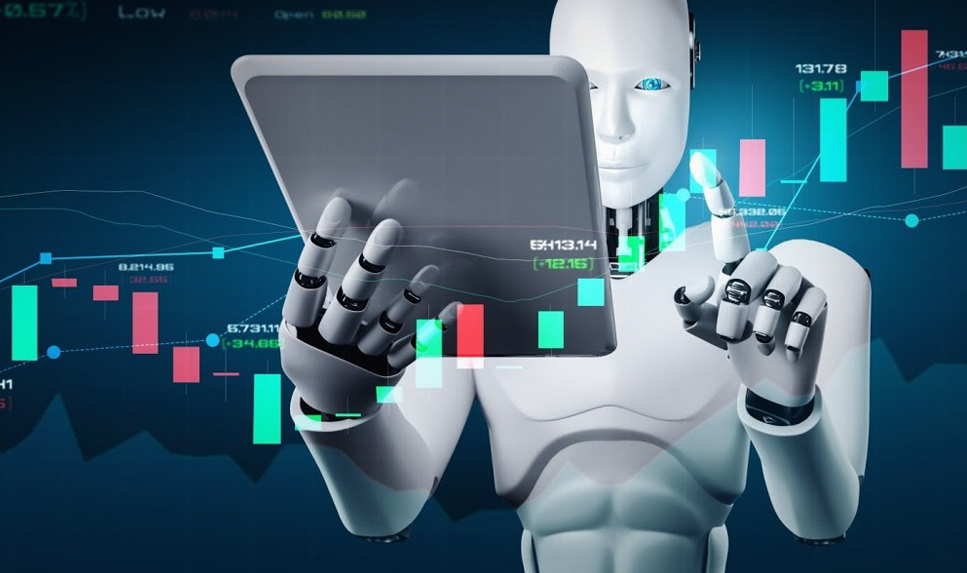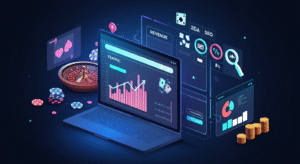
With digital transformation, stock trading has evolved significantly, enabling investors to trade seamlessly from their mobile devices. The demand for stock trading app development has surged as more people seek user-friendly platforms to buy, sell, and manage their investments efficiently. This blog delves into the essentials of stock trading app development, its features, tech stack, challenges, cost estimation, revenue models, and how to build a robust trading platform.
Understanding Stock Trading Apps
Stock trading apps facilitate the buying and selling stocks, ETFs, and other securities online. These apps provide real-time market data, analytics, AI-driven insights, and a seamless trading experience, eliminating the need for traditional brokerage firms. Integrating advanced AI and machine learning models further enhances user experience, automating trade strategies and predicting market trends with high accuracy.
Types of Stock Trading Apps
- Traditional Stock Trading Apps – These platforms offer full-fledged brokerage services with research tools and trading options.
- Robo-Advisors – AI-driven platforms that manage portfolios automatically based on users’ risk tolerance and investment goals.
- Cryptocurrency Trading Apps – Apps designed for trading digital assets alongside traditional stocks.
- Social Trading Platforms – Allow users to follow expert traders and copy their strategies in real-time.
- Commission-Free Trading Apps—These platforms operate on a freemium model and generate revenue through alternative means, such as premium subscriptions.
- Fractional Trading Apps – Allow users to purchase fractional shares of high-value stocks, making investing more accessible.
Key Features of a Stock Trading App
1. User Registration & Authentication
- Secure sign-up with two-factor authentication (2FA)
- KYC (Know Your Customer) verification and identity verification
- Biometric authentication options for enhanced security
2. Dashboard & User Interface
- Intuitive UI displaying portfolio, market trends, and performance metrics
- Customizable watchlists and real-time stock updates
- Dark and light mode UI options for better user experience
3. AI-Powered Insights & Analytics
- AI-driven stock recommendations based on user behavior
- Sentiment analysis for market trends
- Predictive analytics for investment strategies
- AI-powered chatbot assistance for trade queries
4. Seamless Trading & Transactions
- Buy/sell stocks in real time with a single tap
- Instant deposits and withdrawals via multiple payment gateways
- Automated trading options based on pre-set parameters
5. Security & Compliance
- End-to-end encryption and secure API integration
- Compliance with financial regulations like SEC, FINRA, and GDPR
- Fraud detection algorithms and suspicious activity monitoring
6. Push Notifications & Alerts
- Real-time price alerts and market updates
- Personalized investment insights based on AI analysis
- Customizable notifications for order execution and market changes
7. Social & Community Features
- Discussion forums and social trading options
- Live chat support with financial advisors
- AI-driven news aggregation and analysis
Tech Stack for Stock Trading App Development
Frontend Development
- Languages: React Native, Flutter, Swift (iOS), Kotlin (Android)
- UI Frameworks: Material UI, Bootstrap
Backend Development
- Languages: Node.js, Python, Java
- Frameworks: Django, Spring Boot
- Databases: PostgreSQL, MongoDB
AI & Data Processing
- Machine Learning Frameworks: TensorFlow, Scikit-Learn
- Data Analytics: Apache Kafka, AWS SageMaker
Security Measures
- Biometric authentication (Face ID, fingerprint)
- Secure cloud hosting (AWS, Google Cloud, Microsoft Azure)
- Encrypted communication using SSL/TLS
Challenges in Stock Trading App Development
Regulatory Compliance
Stock trading apps must adhere to financial laws and regulations to avoid legal issues. Compliance with GDPR, FINRA, and SEC is crucial.
Data Security & Fraud Prevention
With increasing cyber threats, implementing advanced security measures is essential to protect user data and transactions.
Real-Time Data Processing
Stock prices fluctuate rapidly, requiring robust infrastructure for large-scale real-time data processing.
User Trust & Retention
Users expect reliability and transparency, so a trust-centric platform with accurate analytics and user-friendly features is necessary.
Monetization Strategies for Stock Trading Apps
- Commission-Based Model: Charging a fee per trade.
- Subscription Model: Offering premium services for a monthly/annual fee.
- Freemium Model: Providing basic trading for free and charging for advanced tools.
- Payment for Order Flow (PFOF): Earning revenue from trade execution partners.
- Margin Trading: Offering users the ability to trade on borrowed funds.
The Role of AI in Stock Trading App Development
AI is revolutionizing stock trading app development by enhancing decision-making and automating investment strategies.
1. Algorithmic Trading
- AI executes trades at optimal prices by analyzing market conditions in real-time.
2. Sentiment Analysis
- AI evaluates financial news and social media trends to determine market sentiment.
3. Predictive Analytics
- AI-driven predictions help investors make informed decisions based on historical data and market trends.
4. Fraud Detection
- AI monitors trading patterns to identify and prevent fraudulent activities.
How to Develop a Stock Trading App?
Step 1: Market Research & Compliance
Analyze competitors, define target users, and ensure regulatory compliance before starting the development process.
Step 2: Define Features & Tech Stack
Based on your business model, decide on essential features, integrations, and technology stack.
Step 3: Design UI/UX
A well-designed UI ensures an intuitive and seamless trading experience.
Step 4: Develop & Integrate APIs
Develop the backend, integrate third-party APIs (market data providers, payment gateways), and implement AI-powered features.
Step 5: Test & Launch
Rigorous testing ensures security, reliability, and a bug-free experience before deployment.
Step 6: Maintenance & Updates
Regular updates and feature enhancements help maintain user engagement and security compliance.
Cost of Stock Trading App Development
- Basic App: $30,000 – $50,000
- Mid-Level App: $50,000 – $100,000
- Advanced AI-Powered App: $100,000 – $200,000+
Final Thoughts
Developing a stock trading app requires expertise in fintech, AI integration, and regulatory compliance. A well-designed app with robust security and AI-powered insights can attract traders and investors. Partnering with a professional AI app development company can ensure a seamless and secure platform if you want to build a cutting-edge stock trading app.







